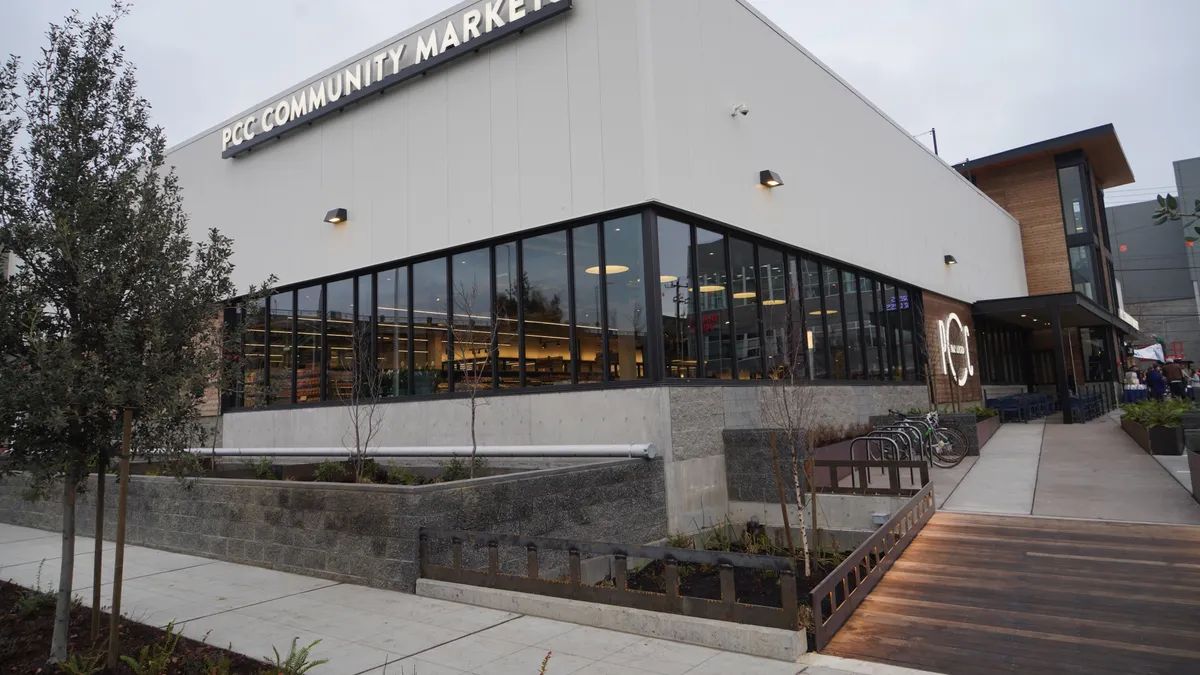Dive Brief:
- PCC Community Markets has received the Living Building Challenge (LBC) Petal Certification for green building standards at one of its stores, making it the first grocer in the world to obtain the certification, the Seattle-based cooperative announced Tuesday.
- PCC Community Markets’ store in the Ballard neighborhood of Seattle got the certification from the International Living Future Institute (ILFI), an environmental NGO, after years of working to eliminate harmful chemicals and rethink store design.
- The food co-op said it plans to meet the environmental requirements at more of its stores as grocers increasingly focus on environmental and health impacts.
Dive Insight:
Two other PCC stores, one in West Seattle and the other in Bellevue, Washington, were built to meet the ILFI's Petal Certification and are currently undergoing evaluation. Meanwhile, three PCC stores in the Seattle metro area — the upcoming downtown and Madison Valley stores and soon-to-be relocated Kirkland location — are working to meet certification requirements, according to the announcement.
PCC, which is the largest community-owned food market in the U.S. with 15 stores in the Puget Sound area, emphasized its focus on nature and the local community in its efforts to earn the certification. The latest announcement builds on the food co-op's long history of sustainability measures, like being one of the first grocers to ban plastic bags and replacing its receipt paper with a BPA-free alternative.
PCC worked for more than two years to review its building materials and equipment at the Ballard store to eliminate items on the LBC's “Red List” of more than 800 toxic substances, leading the grocer to find new vendors and suppliers for things like paints, concrete finishes and drywall. PCC decided to replace checkout belts that were originally slated to include polyvinyl chloride, a Red List substance, with a urethane/polyester alternative. It also replaced a powder coating one of its lighting manufacturers used with a safer alternative and installed LED fixtures to complement efforts to maximize natural lighting throughout the store.
PCC worked with Kyler Martz, a Seattle illustrator and artist, on an art installation featuring a 16-foot-tall octopus made from hundreds of used ramekins from a local restaurant and an underwater-themed mural at the entrance of the store.
The co-op also financially supported ILFI’s Habitat Exchange Program to protect an ecosystem of roughly 27,000 square feet — about the same size as the Ballard store or roughly half the size of a professional football field. While not a part of the certification requirements, PCC noted other eco-friendly details of the Ballard store, including steam cookers that utilize 90% less water and a carbon dioxide refrigeration system with a significantly reduced global warming impact compared to conventional systems.
ILFI describes its Living Building Challenge as "the world’s most advanced, holistic performance standard for buildings," and requires companies to meet goals — or "petals" — for building materials, local community impact and beauty. In recent years, other grocers like Whole Foods, Ahold Delhaize and Kroger have aimed for using greener building materials, turning to environmentally friendly packaging and selling more sustainable food.






